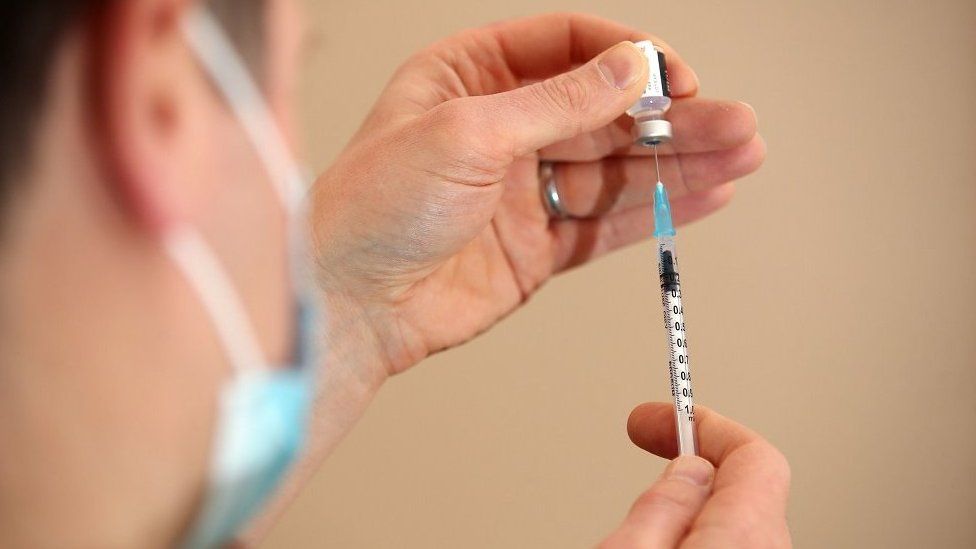Senior doctors want gap between Covid jabs halved

PA Media
Senior doctors are calling on England’s chief medical officer to cut the gap between the first and second doses of the Pfizer-Biontech Covid-19 vaccine.
Health officials extended the wait from three to 12 weeks to get supplies to as many people as possible.
But in a letter seen by the BBC, the British Medical Association said the gap should be six weeks, saying the policy was “difficult to justify”.
Prof Chris Whitty said it would double the number of people receiving jabs.
Speaking at a Downing Street briefing on Friday, Prof Whitty said extending the gap was a “public health decision” that would allow “many more people to be vaccinated much more quickly”.
The UK is administering both parts of the Pfizer and Oxford-AstraZeneca vaccines 12 weeks apart, having initially planned to leave three weeks between the Pfizer jabs.
-
Hotel quarantine for UK arrivals to be discussed
- UK variant ‘may be more deadly’
In a private letter to Prof Whitty, the British Medical Association (BMA) said it agreed that the vaccine should be rolled out “as quickly as possible” – but called for an urgent review and for the gap to be reduced to six weeks.
The doctors’ union said the UK’s strategy “has become increasingly isolated internationally” and “is proving evermore difficult to justify”.
The World Health Organization has recommended a gap of four weeks – to be extended only in exceptional circumstances to six weeks.
“The absence of any international support for the UK’s approach is a cause of deep concern and risks undermining public and the profession’s trust in the vaccination programme,” the letter said.
The BMA suggested second doses might not be guaranteed after a 12-week delay “given the unpredictability of supplies”.


There has been understandable enthusiasm over a promising start to the hugely ambitious UK vaccination rollout.
But there has been some tension over the decision to lengthen the time between doses for the Pfizer vaccine to 12 weeks.
Prof Whitty and other health leaders and experts say this will allow many more people to get vaccinated quickly and the first dose gives most of the protection.
But critics argue this goes against Pfizer’s recommendation of a three-week gap and there is no data to back up the long delay.
The intervention of the BMA is significant as it shows senior doctors now have widespread concerns, including worries about reliability of supplies if people have to wait longer for a second jab.
This is a private letter to Prof Whitty seen by the BBC and not a grandstanding press release.
The BMA wants to have talks with the chief medical officer about moving to six weeks.
Prof Whitty will no doubt restate his case.
It will be interesting to see whether the BMA argument gains traction in the wider medical world.

Other issues highlighted in the letter include:
- Concerns that one dose of the Pfizer jab “does not produce sufficient neutralising antibodies and the potential to reduce transmission”
- A mismatch between policies across the UK – in particular, Northern Ireland’s decision to give the Pfizer vaccine to care home residents and staff within three weeks
- Reports from Israel’s vaccination programme suggesting “lower protection than expected”
The Department of Health and Social Care said the decision to extend the wait “followed a thorough review of the data and was in line with the recommendations of the UK’s four chief medical officers”.
“Our number one priority is to give protection against coronavirus to as many vulnerable people as possible, as quickly as possible,” a spokeswoman said.
- Why won’t vaccinating the vulnerable end lockdown?
- When will I get a Covid vaccine?
- How does the Pfizer vaccine work?
She said both the Pfizer and Oxford vaccines provide a “high degree of protection after the first dose”.
“The government has closely followed the guidance of the Joint Committee on Vaccination and Immunisation (JCVI) which was clear that we should give as many people as possible some level of immunity initially,” she added.
The Pfizer and Oxford vaccine are both expected to work against the variant of Covid-19 that emerged in the UK.
At Friday’s briefing, Prime Minister Boris Johnson said early evidence suggests the variant may be more deadly.
Previous work suggests the new variant spreads between 30% and 70% faster than others, and there are hints it is about 30% more lethal.
His comments came as ministers prepared to discuss whether to further tighten restrictions at UK borders, including the possibility of hotel quarantines for travellers.
Prof Whitty said the UK is at an “extremely precarious” point, despite signs that infections are beginning to fall.
A further 40,261 cases, and 1,401 deaths within 28 days of a positive coronavirus test were reported on Friday in the UK.

- FANCY A FILM?: From La La Land to Dunkirk, your lockdown weekend is sorted
- THRIFTY COOKING: Dr. Rupy creates three scrumptiously tasty meals for less than £1 per portion

Published at Sat, 23 Jan 2021 03:12:58 +0000




Comments
Loading…